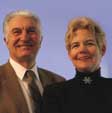 A
fighting chance "We give patients several different exposures so that the radiation penetrates better, causing cancer cells to die," said Robert O'Donnell, an associate professor of internal medicine and physician in the radioimmunotherapy program. "There is some anticancer activity from the antibody, but we think the greatest benefit comes from the radiation." Gerald DeNardo, professor emeritus of internal medicine and radiology, and Sally DeNardo, a professor of internal medicine and radiology, pioneered the federally funded program at UC Davis. As a Phase I-II study, it is geared for patients in "salvage mode" - those who haven't responded to conventional chemotherapy and radiation. These are the sickest of the sick - cancer patients who come to the outpatient clinic seeking precious months and years of life. In 1985, the DeNardos treated their first patient, a woman with non-Hodgkin's lymphoma. She was expected to die within days; instead, she had a partial remission and lived for three more years. It was the first time in the United States that radioimmunotherapy had been used on a lymphoma patient. Since 1985, 217 patients have undergone radioimmunotherapy at the medical center, 129 of them with lymphoma. Sixty percent of lymphoma patients responded to treatment. Of these, 90 percent were improved and their tumors shrank. Another 30 percent had complete remissions.
Home |
Table of Contents |
To our Readers |
Building on Basics UC Davis Health System | © 2000, 2001, 2002 UC Regents. All rights reserved. |
Gerald
and Sally DeNardo are the principle investigators of the radioimmuno- |

